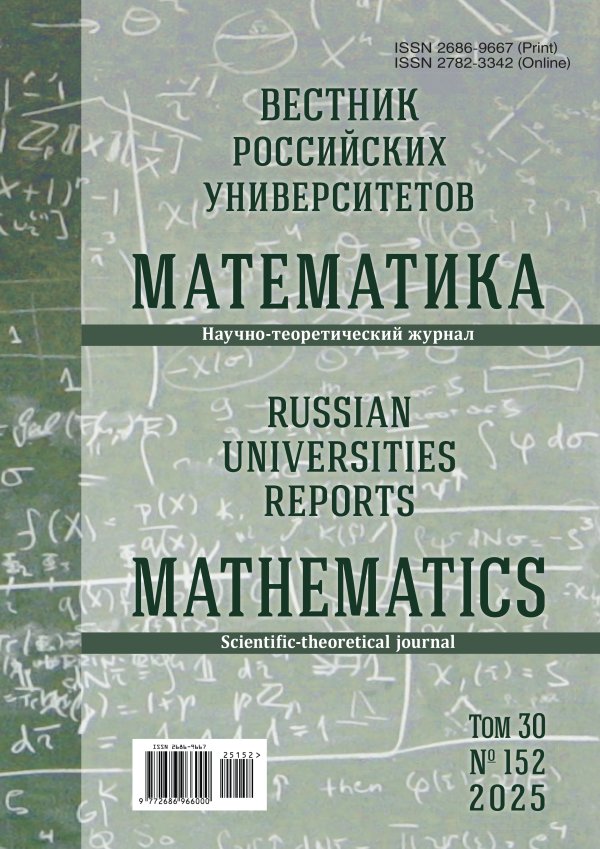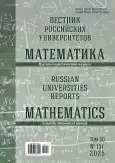Метод возмущений и регуляризация принципа Лагранжа в нелинейной задаче оптимального управления с поточечным фазовым ограничением-равенством
- Авторы: СУМИН М.И.1
-
Учреждения:
- ФГБОУ ВО «Тамбовский государственный университет им. Г.Р. Державина»
- Выпуск: Том 30, № 151 (2025)
- Страницы: 275-304
- Раздел: Научные статьи
- URL: https://journal-vniispk.ru/2686-9667/article/view/326498
- ID: 326498
Цитировать
Аннотация
Рассматривается регуляризация принципа Лагранжа (ПЛ) и теоремы Куна-Таккера (TKT) в недифференциальной форме в нелинейной (невыпуклой) задаче оптимального управления системой обыкновенных дифференциальных уравнений с поточечным фазовым ограничением-равенством. Существование решения задачи априори не предполагается. Ограничение-равенство содержит аддитивно входящий в него параметр, что обеспечивает возможность применения для исследования задачи "нелинейного варианта" метода возмущений. Основное предназначение регуляризованных ПЛ и TKT - устойчивое генерирование обобщенных минимизирующих последовательностей (ОМП) в рассматриваемой задаче. Их можно трактовать как ОМП-образующие (регуляризирующие) операторы, ставящие в соответствие каждому набору исходных данных задачи субминималь (минималь) ее отвечающего этому набору регулярного модифицированного функционала Лагранжа (МФЛ), двойственная переменная в котором генерируется в соответствии с процедурой стабилизации по Тихонову двойственной задачи. Конструкция МФЛ полностью определяется видом "нелинейных" субдифференциалов (проксимальный субградиент, субдифференциал Фреше) полунепрерывной снизу функции значений как функции параметра задачи. Регуляризованные ПЛ и TKT "преодолевают" свойства некорректности классических аналогов, составляя тем самым теоретическую основу для создания устойчивых методов решения нелинейных задач оптимального управления. В частном случае, когда задача регулярна в смысле существования в ней обобщенного вектора Куна-Таккера, а ее исходные данные аффинным образом зависят от управления, предельный переход в соотношениях регуляризованной TKT ведет к условиям оптимальности в форме соответствующих недифференциальной TKT и принципа максимума Понтрягина.
Об авторах
Михаил Иосифович СУМИН
ФГБОУ ВО «Тамбовский государственный университет им. Г.Р. Державина»
Автор, ответственный за переписку.
Email: m.sumin@mail.ru
ORCID iD: 0000-0002-3700-6428
доктор физико-математических наук, ведущий научный сотрудник
Россия, 392000, Российская Федерация, г. Тамбов, ул. Интернациональная, 33Список литературы
- Ф.П. Васильев, Методы оптимизации: В 2-х кн., МЦНМО, М., 2011.
- Ж. Адамар, Задача Коши для линейных уравнений с частными производными гиперболического типа, Наука, М., 1978.
- А.Н. Тихонов, В.Я. Арсенин, Методы решения некорректных задач, Наука, М., 1974.
- А.Д. Иоффе, В.М. Тихомиров, Теория экстремальных задач, Наука, М., 1974.
- В.М. Алексеев, В.М. Тихомиров, С.В. Фомин, Оптимальное управление, Наука, М., 1979.
- Некорректные задачи естествознания, ред. А.Н. Тихонов, А.В. Гончарский, Изд-во МГУ, М., 1987.
- А.Н. Тихонов, А.С. Леонов, А.Г. Ягола, Нелинейные некорректные задачи, Наука, М., 1995.
- М.И. Сумин, “Регуляризованная параметрическая теорема Куна–Таккера в гильбертовом пространстве”, Журн. вычисл. матем. и матем. физ., 51:9 (2011), 1594–1615.
- М.И. Сумин, “Регуляризованные принцип Лагранжа и принцип максимума Понтрягина в оптимальном управлении и обратных задачах”, Тр. Ин-та математики и механики УрО РАН, 25:1 (2019), 279–296.
- М.И. Сумин, “Принцип Лагранжа и его регуляризация как теоретическая основа устойчивого решения задач оптимального управления и обратных задач”, Вестник российских университетов. Математика, 26:134 (2021), 151–171.
- А.В. Арутюнов, Условия экстремума. Анормальные и вырожденные задачи, Факториал, М., 1997.
- А.А. Милютин, А.В. Дмитрук, Н.П. Осмоловский, Принцип максимума в оптимальном управлении, Центр прикладных исследований мехмата МГУ, М., 2004.
- М.И. Сумин, “Устойчивая секвенциальная теорема Куна–Таккера в итерационной форме или регуляризованный алгоритм Удзавы в регулярной задаче нелинейного программирования”, Журн. вычисл. матем. и матем. физ., 55:6 (2015), 947–977.
- М.И. Сумин, “Метод возмущений и регуляризация принципа Лагранжа в нелинейных задачах на условный экстремум”, Журн. вычисл. матем. и матем. физ., 64:12 (2024), 2312-2331.
- М.И. Сумин, “О регуляризации классических условий оптимальности в выпуклых задачах оптимального управления”, Тр. Ин-та математики и механики УрО РАН, 26:2 (2020), 252–269.
- Дж. Варга, Оптимальное управление дифференциальными и функциональными уравнениями, Наука, М., 1977.
- Е.Г. Гольштейн, Теория двойственности в математическом программировании и ее приложения, Наука, М., 1971.
- P.D. Loewen, Optimal Control via Nonsmooth Analysis, CRM Proceedings & Lecture Notes, 2, Amer. Math. Soc., Providence, RI, 1993.
- F.H. Clarke, Yu.S. Ledyaev, R.J. Stern, P.R. Wolenski, Nonsmooth Analysis and Control Theory, Graduate Texts in Mathematics, 178, Springer-Verlag, New York, 1998.
- B.S. Mordukhovich, Variational Analysis and Generalized Differentiation I: Basic Theory, Grundlehren der mathematischen Wissenschaften, 330, Springer, Berlin, 2006.
- М.И. Сумин, “Метод возмущений, субдифференциалы негладкого анализа и регуляризация правила множителей Лагранжа в нелинейном оптимальном управлении”, Тр. Ин-та математики и механики УрО РАН, 28:3 (2022), 202–221.
- М.И. Сумин, “О регуляризации недифференциальной теоремы Куна–Таккера в нелинейной задаче на условный экстремум”, Вестник российских университетов. Математика, 27:140 (2022), 351–374.
- В.А. Треногин, Функциональный анализ, Наука, М., 1980.
- М.И. Сумин, “Недифференциальные теоремы Куна–Таккера в задачах на условный экстремум и субдифференциалы негладкого анализа”, Вестник российских университетов. Математика, 25:131 (2020), 307–330.
- Л. Янг, Лекции по вариационному исчислению и теории оптимального управления, Наука, М., 1974.
- М.И. Сумин, “О некорректных задачах, экстремалях функционала Тихонова и регуляризованных принципах Лагранжа”, Вестник российских университетов. Математика, 27:137 (2022), 58–79.
- Д. Бертсекас, Условная оптимизация и методы множителей Лагранжа, 1-е изд., Радио и связь, М., 1987.
- М. Мину, Математическое программирование. Теория и алгоритмы, 1-е изд., Наука, М., 1990.
- Е.Г. Гольштейн, Н.В. Третьяков, Модифицированные функции Лагранжа. Теория и методы оптимизации, Наука, М., 1989.
- Ж.-П. Обен, Нелинейный 126355анализ и его экономические приложения, Мир, М., 1988.
- М.И. Сумин, “Регуляризация в линейно выпуклой задаче математического программирования на основе теории двойственности”, Журн. вычисл. матем. и матем. физ., 47:4 (2007), 602–625.
Дополнительные файлы








